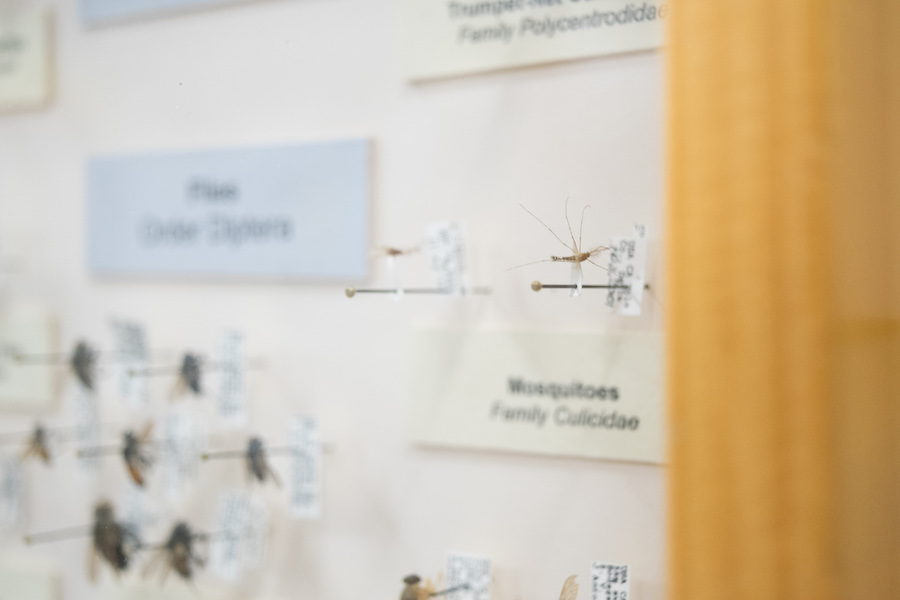
UC Davis experts discuss Zika virus and it’s recent outbreaks
On Feb. 1, The World Health Organization declared Zika virus a “public health emergency of international concern.” Zika virus is transmitted by the infected Aedes species mosquito, with recent outbreaks throughout the world having caused health officials to become alarmed. On Feb. 10, it was confirmed that a Yolo County resident tested positive for Zika virus.
The virus was first isolated in 1947, when the virus was found in the blood of a macaque monkey in Uganda. Since then, periodic outbreaks in humans has caused scientists to presume that the virus was transmitted between forest mosquitos and non human primates.
UC Davis experts spoke out about the virus to address the growing fear amongst Yolo county residents.
“The mosquito bridges between the monkey and the person,” said virologist in the UC Davis School of Veterinary Medicine’s Department of Pathology, Microbiology and Immunology Lark Coffey. “The virus replicated in a monkey and when it does that it makes high levels of virus in the blood so then when another feeding mosquito came they picked up the virus and [fed on a person].”
About 80 percent of people infected with the virus show no symptoms that would prompt them to visit the doctor.
“The remaining 20 percent would typically have something along the lines of a flu — illnesses like a fever or potentially a rash. Those are common symptoms of viral illness in general,” said Chris Barker, a researcher in the UC Davis School of Veterinary Medicine’s Department of Pathology, Microbiology and Immunology.
According to The Washington Post, more than 4,000 cases of microcephaly in babies have been reported in Brazil since last fall. Microcephaly is a condition which results in physically smaller heads due to underdeveloped brains. Some attribute this to the outbreak of Zika virus.
“That’s what made so much news interest about Zika. The fact that it’s spreading into new places is really terrible,” Coffey said. “What has everyone so concerned is that when Zika got into Brazil at the very end of last year in the time between November 2015 and now, obstetricians started noting there was a higher incidence of microcephaly.”
According to Coffey, people made the association that Zika causes microcephaly. However, that assumption is not definitive.
“Just because it’s an association, doesn’t for sure mean its causal,” Coffey said. “There are a lot more studies that need to be done to actually prove that infection of the mother during pregnancy causes [the] small head in the baby.”
Zika virus may also be linked to Guillain-Barré syndrome, a neurological disease that can lead to the paralyzation of one’s body.
“It’s possible that Zika […] has always been causing this neurologic disease in adults and microcephaly in babies but we’ve just never seen it yet,” Coffey said. “Maybe what it took — really sadly — is that the virus had to get into enough people that we could see these effects that could happen, because the more people it infects the more of those minority cases you see.”
At the time being, there is no vaccine or treatment for Zika virus. According to former UC Davis professor in the Department of Entomology Thomas Scott, controlling mosquito populations and preventing human contact could be the current most feasible solution, including using insecticides to kill the mosquito.
“Some of the things you could do [to prevent getting the virus] would be to wear long pants and long sleeves — so a physical barrier,” Scott said. “How close you are to someone socially actually increases your risk of infection. The mosquitoes don’t fly very far they usually stay in the house where they emerged as an adult. It’s primarily people that are moving the virus around.”
There have been over 50 reported cases of Zika virus in the U.S., all of them as a result of international travel.
“Travelers are bringing Zika into the United States but that happens with all mosquito-borne viruses. People are great spreaders,” Coffey said. “What we’re worried about here is that [when] people [who have] a high level of [Zika] virus go outside and get fed on by the right mosquito vector, which can transmit to another host, they start a focal transmission cycle, and that’s what can lead to human outbreaks.”
Written by: Fatima Siddiqui – features@theaggie.org



